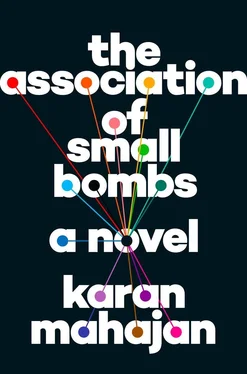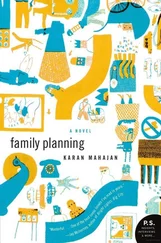Mukesh watched her sympathetically, his head slightly askance, as if looking at something around a curtain. His brows were distended with worry; he drummed the table in a way that suggested he was watching but that she was free to continue; that what she was going through was natural; he wasn’t going to draw attention to it, not until she wanted him to.
Deepa had always disliked Mukesh but she saw now that he had a certain natural comfort with women, surprising for such a bearish, hairy fellow, one who always barked at servants and saluted everyone as he passed them on the street. “It’s been very difficult,” she said.
He remained quiet; she saw that the whites of his eyes were filigreed at the sides with red capillaries.
“We’ll make sure you meet the terrorists,” he said, standing up and coming around to her. He was behind her now, with his hands on her shoulders. “You don’t even worry for one second.”
________
Why did she want to meet the terrorists? She suspected it was because she was on the verge of parting from life, and she wanted all the loose ends tied up before she went, joining her boys wherever they were. So there was a galloping excitement within her: the thrill of meeting the men who had killed her sons; also, the thrill of her own death.
“Naidu won’t be able to help you,” Jagdish Chacha, the former cabinet secretary, said when she went to see him at his flat in the complex. “Mukesh likes talking. The person who can help you is Jagmohan or Kiran Bedi. I’ll phone them. But tell me: How is Vikas?”
“He’s OK, uncle. Busy with work.”
“Good. He has another film project these days?”
“Yes, uncle. A documentary.”
“It’s good that he’s outside,” Jagdish said. “Being outside I’ve found is crucial. Inside, one’s soul starts to get poisoned. When Indira-ji died,” he said, referring to Indira Gandhi, “I went and exercised every day. Now, tell me, what kind of meeting do you want?”
“Whatever is possible, uncle,” Deepa replied.
“You can meet them as people do in prisons — through a window in the meeting room. You go, queue up all day, and then you get to meet the person for five, ten minutes. If you go, you’ll see everyone has come there with tiffin boxes. Of course you won’t have to stand in the queue.
“But you can also meet them, or one of them, face-to-face in a room. Technically this is not allowed, but a jail is like a school — if you know the principal you can do anything. It might be that we’ll have to say you’re a journalist — can Vikas bring his press ID? — otherwise they, the terrorists, won’t want to meet you. Just to warn you, I’m not sure how much you’ll gain. When the militancy was happening in Punjab, I remember, many politicians wanted to meet the militants in jail, to shout at them. But the meetings were never satisfactory. They always found that the militants were reasonable men, which was even more difficult than finding out the opposite.” He was lost now in the halls of his past power, traversing them for impressive tidbits — Deepa had seen this before with Jagdish Chacha. She wasn’t friendly with him but knew his wife well and so had an idea of his idiosyncrasies.
When he was done, he said, “Now, you go rest. The family is behind you. All his life Papa-ji fought against this kind of fundamentalism from the Muslims. We’ll make sure you get everything you want.”
________
Funny, Deepa thought — how this kind of tragedy unites and energizes a family. I’ve not just asked these old men for favors; I’ve reinvigorated their lives with purpose.
A few days before the blast, Tushar had come into the kitchen in the morning to watch her at work. An earnest boy, he loved the hectic action of the kitchen. “And how much frosting do you have to make for the order, Mama?” he asked.
“Two or three kilos since it’s a bulk order,” she said. “And we’ll let it cool in the afternoon. Hopefully we’ll have electricity so it won’t turn green from mold. You want to mix it?”
He did. With the whisk tight in his hand, he churned the butter and the sugar. He was not as effeminate as his father made him out to be. It was a matter of context. In the context of the kitchen he was an expert. As he mixed the frosting, Deepa hugged his small frame from behind.
Later that evening Nakul played “Edelweiss” for her on the small guitar they had bought him. “Edel Vyes, Edel Vais, every morning you greet me,” he sang.
Now, back home from visiting Mukesh, Deepa reflected on the tragic oddness of her own life, how she’d grown up in a tiny family in Bangalore, the only daughter of a reclusive man who ran a famous bookstore and could talk about nothing but sixties rock ’n’ roll (he had not been a recluse before his wife died, though she could barely remember that); how she’d been a shy and frightened but persevering creature, doing well in school and ending up in Delhi and working for Arthur Andersen, the CA firm, thanks to a family connection — Delhi, that odd world, so much more spacious and rude than Bangalore; Delhi, a place where no one was firmly rooted and there was a sense that if a better city presented itself just fifty kilometers away, the opportunistic inhabitants would immediately quit the city, caring not a jot for the earth that had nurtured them. And, of course, out of all these Delhiites, these savage North Indians, she’d picked Vikas. Or Vikas had picked her. She’d liked him because, in the middle of the rude crush, he had the disarming gentleness of a South Indian — he was a Punjabi but he could have been sprung from St. Joseph’s. Calm, sympathetic, patient, he was a good listener, marked with none of the prejudices she imagined North Indians carried toward South Indian Christians (and she wasn’t wrong about these prejudices: years later, when she became a de facto Punjabi as well, she learned that most North Indians thought all Christian women were maids); and their courtship had an easy, light quality; they’d melted like two shy creatures into one another.
Tears came to her eyes remembering those early days — days of infatuation. After that everything had gone to ruin. Vikas slipped into a depression about his career as a documentary filmmaker from which he never recovered — angry first at his family for not understanding why he wished to be an artist rather than a CA (“There’s only one artist in the whole bloody family and they can’t even handle that!”) and then at himself for having chosen such a nugatory, ascetic path at a time when India was booming with money and rupees fell from the trees like soft petals, enriching even the fools of his family, whose property values shot up. How many times had she told him to quit? To go back to being a CA? To do something else? To sell his inherited lands in Patiala? But he refused. Descending into bitterness, surrounded by the braying, pointing, mocking audience of his family, he had become attached to his own pain. He did not want to make changes because that would mean losing his precious exchequer of bitterness.
And then there were the kids. He had, in his bitter, depressive way, been opposed to having any, but she had pushed him and pressured him, sending subtle messages through family members, thinking that children would rouse him from his emotional torpor, give him a reason to act . And, in fact, there was a change in him after Tushar was born. Vikas loved the boy in the obsessive, cuddly way he loved animals — constantly nuzzling against him, singing wicked, demented songs; he was energized (as many artists are) by his own creation.
But soon he lost interest in Tushar and Nakul and returned to his depressive state — in fact, he blamed the boys for exacerbating his depression. “We should never have brought them up here, with the influence of this family. They’ve also turned out to be Punjabi brutes with no understanding of art.”
Читать дальше












